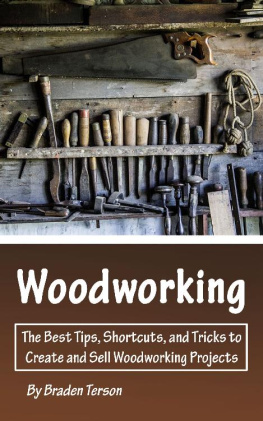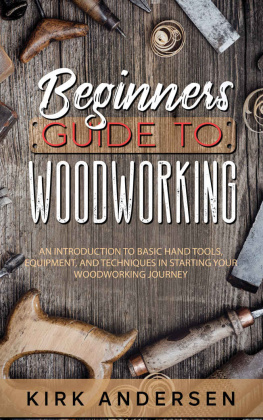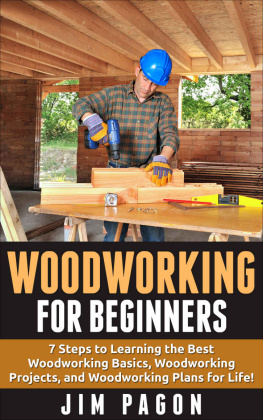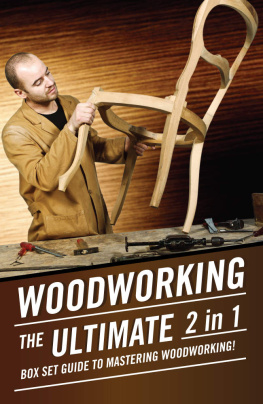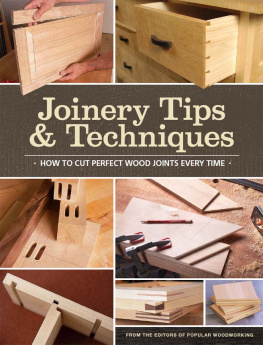125 Tips & Tricks for Woodworking
By James Parker
James Parker 2019.
Copyright Notice
No part of this book may be reproduced or transmitted in any form whatsoever, electronic, or mechanical including photocopying, recording or by any informational storage and retrieval system without the express written dated and signed permission of the author.
Disclaimer/ and or Legal Notice
The information presented herein represents the view of the author as of the date of publication. Because of the rate with which conditions change, the author reserves the right to alter and update his opinions based on new conditions.
This book is for informational purposes only. While every attempt was made to verify the information provided here, neither the author nor his affiliates or publisher assume any responsibility for errors inaccuracies or omissions. Any slights to people or organizations are unintentional.
All images and the contents on this book are believed to be public domain, they are gathered from all over the net and there is no copyright on these pictures and contents as far as we are concerned. If there is a picture or contents on this book that has copyright then the owner can email us and we will remove the picture from this book. None of the persons on this book have authorized their presence here, this book is not associated with them or their companies in any way. All trademarks belong to their respective owners.
Always consult your doctor or physician before you begin any diet or weight loss program. We are NOT LIABLE for losses or damages which may result through the use of the information, products and services presented on this Book.
Preface
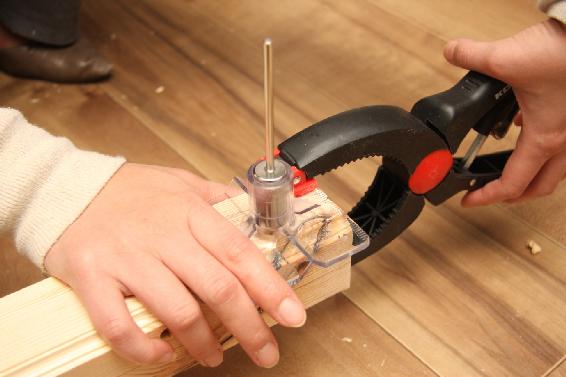
Starting in a woodworking either as hobby or as profesional can seems a difficult and hard task. From specialized woodworking tools to the identification and understanding of different wood types, there is a lot to know that even veterans are still developing their craft.
But learning and experimentation is what carpentry is about.
Here in this book you will Find 125 Tips and tricks for woodworking which Im sure will help not only fresh users but older users will also find some gems.
1.Perfect Bar Clamp Cover
Iron clamps can easily damage softer woods or react with glue to discolor wood. My solution is to cut a section of PVC plastic pipe and place it around the pipe. If you have several short lengths, you can strategically place them to fit different widths of wood.
2. Quick Blade-Height Gauge
This gauge block is the fastest way to adjust the height of a saw blade. This is made of a 3-in. Length of 4 4 cuts the most used settings. If you need more parameters, just create another block.
If you then need to reset the saw blade, these blocks will help you get the job done quickly. Click here for more tips on the table saw.
3. Flexible Sanding Block From The Office
Rectifying the curves is difficult. Sometimes you need a firm and flexible sanding pad. A small notebook works very well. Simply wrap the abrasive paper around the pad and bend it in the desired arc.
Slide one end of the sandpaper between the sides to secure it to the bracket. Try it the next time you work on a project with turns and hard-to-reach places.
We asked our favorite carpenters to share some of their favorite shopping tips. Read these 10 great tips on woodworking to work faster and smarter in your own business.
4.Cheap Stain Sprayer
It is an easier way to dye or seal chairs, bars or other objects with many narrow recesses. Pour the stain into a clean, empty vaporizer ($ 3). Spray the stain on the project and wipe off the excess with a brush or rag.
The sprayer sprays the stain into all cracks and narrow, hard-to-reach cords. Learn more about wood coloring.
5. Easy Odd-Width Measuring
How do you divide 11-3 / 8-in? (or another mathematically difficult number) in equal parts, without dividing the fractions? Simple. Align the ribbon on the piece until its size is easy to divide. Mark the band with an angle.
Suppose you want to share an entry 11-3 / 8. Tip in three equal parts. Align the tape to read 12 inches. Then select "4" and "8". More: More tips and tricks to measure.
6. Bi-Fold Workbench
The old doors on sawmills are excellent temporary workbenches, but they take up a lot of space if you do not use them. Instead of big doors, I use folding doors with hinges to fold them back after work. They are also easier to pick up on the road. - Harry Steele. Here are 12 simpler workshops that you can create.
7. Make Your Own Table Saw Fence
This self-locking table saw guide can be built in seconds and allows you to snap the saw blade into the fence to create sloped cuts along the edges and extremely thin cuts or cuts. Use a hand or jigsaw to cut 1 4 pieces so that the inside width of the "L" is a hair smaller than the thickness of your saw guide.
Drill 5/16 inch. Holes in the L-blocks and the plywood fence and connect them to two-inch 1/4. x 3 "machine screws, washers and wing nuts As always, be careful when sawing without a blade guard Thank you very much for this new sawing angle to professional furniture manufacturer George Vondriska - take a look at these 16 ingenious tools you need to know!
8. Shelf Bracket To The Rescue
With this smooth system, you can attach a thin material to the edge. Attach a shelf bracket to a workbench, place the material on the edge, and then secure it to the bracket. The clamp holds the material and keeps your hands free for other operations.
9. Hole Saw Drum Sander
Grinding the inside of a hole or curved surface can be difficult. Insert a 1/4 x 3 inch to simplify this task. Bolt into the guide hole of a trephine saw. Secure the screw with a washer and a nut. Cut a 1/4-inch cut with a hacksaw. slot deep in the line with the bolt.
Cut a piece of sandpaper with an adhesive backing so that you can push one end into the slot, wrap it around the cutout, and push the other end into the slot. Screw the bolt into a drill and you now have a drum mill built by you.
10. Socket Sander
Rectifying concave shapes does not have to be difficult. Find a deep grip that matches the contour of your molding. Wrap a piece of sandpaper around the pedestal and hold it with your fingers. Your sanding will be uniform and the fine edges of the molding will not become round. - Eric and Cheryl Secular. In this video, Travis talks about his favorite tips.
11. Super-Small Parts Sander
Im 91 years old, but I still enjoy spending time in the wood shop. I like to make wooden toys and give them to my great-grandkids and charity groups. One trick Ive learned over the years is to use emery boards the kind for filing fingernails to sand small parts.
Emery boards come in different sizes, and some are more abrasive than others, so I keep an assortment on hand.
12. Pocket-Size Glue Spreaders
When gluing boards, use a credit card with serrated scissors along the wide edge. The serrated "pink" edge distributes the glue like a jagged trowel that spreads the mastic on the ground. Thanks to the reader Don Cox for this sweet tip.
13. Quick Miter Fix



